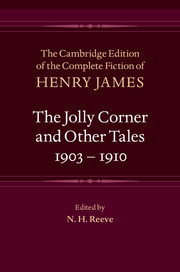Book contents
- Frontmatter
- Contents
- Acknowledgements
- List of Abbreviations
- General Editors’ Preface
- General Chronology of James’s Life and Writings
- Introduction
- Textual Introduction
- Chronology of Composition and Production
- Bibliography
- The Jolly Corner and Other Tales 1903–1910
- Glossary of Foreign Words and Phrases
- Notes
- Textual Variants
- Emendations
- Appendices
II
Published online by Cambridge University Press: 11 April 2021
- Frontmatter
- Contents
- Acknowledgements
- List of Abbreviations
- General Editors’ Preface
- General Chronology of James’s Life and Writings
- Introduction
- Textual Introduction
- Chronology of Composition and Production
- Bibliography
- The Jolly Corner and Other Tales 1903–1910
- Glossary of Foreign Words and Phrases
- Notes
- Textual Variants
- Emendations
- Appendices
Summary
It was after this that there was most of a virtue for him, most of a cultivated charm, most of a preposterous secret thrill, in the particular form of surrender to his obsession and of address to what he more and more believed to be his privilege. It was what in these weeks he was living for—since he really felt life to begin but after Mrs. Muldoon had retired from the scene and, visiting the ample house from attic to cellar, making sure he was alone, he knew himself in safe possession and, as he tacitly expressed it, let himself go. He sometimes came twice in the twenty-four hours; the moments he liked best were those of gathering dusk, of the short autumn twilight; this was the time of which, again and again, he found himself hoping most. Then he could, as seemed to him, most intimately wander and wait, linger and listen, feel his fine attention, never in his life before so fine, on the pulse of the great vague place: he preferred the lampless hour and only wished he might have prolonged each day the deep crepuscular spell. Later—rarely much before midnight, but then for a considerable vigil—he watched with his glimmering light; moving slowly, holding it high, playing it far, rejoicing above all, as much as he might, in open vistas, reaches of communication between rooms and by passages; the long straight chance or show, as he would have called it, for the revelation he pretended to invite. It was a practice he found he could perfectly “work” without exciting remark; no one was in the least the wiser for it; even Alice Staverton, who was moreover a well of discretion, didn't quite fully imagine.
He let himself in and let himself out with the assurance of calm proprietorship; and accident so far favoured him that, if a fat Avenue “officer” had happened on occasion to see him entering at eleven-thirty, he had never yet, to the best of his belief, been noticed as emerging at two. He walked there on the crisp November nights, arrived regularly at the evening's end; it was as easy to do this after dining out as to take his way to a club or to his hotel.
- Type
- Chapter
- Information
- The Jolly Corner and Other Tales, 1903–1910 , pp. 215 - 230Publisher: Cambridge University PressPrint publication year: 2017

